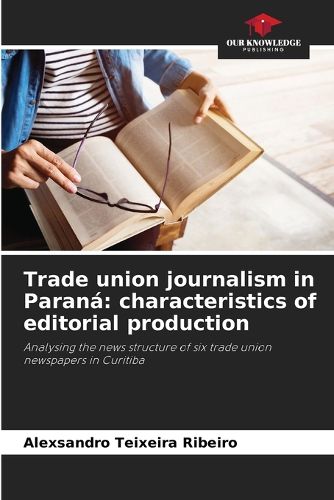Readings Newsletter
Become a Readings Member to make your shopping experience even easier.
Sign in or sign up for free!
You’re not far away from qualifying for FREE standard shipping within Australia
You’ve qualified for FREE standard shipping within Australia
The cart is loading…






This title is printed to order. This book may have been self-published. If so, we cannot guarantee the quality of the content. In the main most books will have gone through the editing process however some may not. We therefore suggest that you be aware of this before ordering this book. If in doubt check either the author or publisher’s details as we are unable to accept any returns unless they are faulty. Please contact us if you have any questions.
More than a century old, the trade union press plays a fundamental role in the history of class struggles as an instrument for defending the ideals and causes of workers in Brazil. With the aim of debating the journalism practised in the trade union press, this study, the result of master's research in journalism carried out at the Postgraduate Programme in Journalism at the State University of Ponta Grossa (UEPG), is the result of an analysis that sought to identify characteristics of contemporary trade union journalism, based on publications from six trade union bodies representing workers in Parana. This work was developed on the theoretical basis of Otto Groth (2011), who recognises journalism as a human cultural production, and under the guidance of the comprehensive method, inspired by Weber, for understanding journalism. In terms of contemporary trade union journalism, based on the trade union publications analysed, this research points out that the trade union press is characterised by the leading role played by the trade union body itself in the topics covered and by the trade union executive board as the predominant voice in the newspapers.
$9.00 standard shipping within Australia
FREE standard shipping within Australia for orders over $100.00
Express & International shipping calculated at checkout
This title is printed to order. This book may have been self-published. If so, we cannot guarantee the quality of the content. In the main most books will have gone through the editing process however some may not. We therefore suggest that you be aware of this before ordering this book. If in doubt check either the author or publisher’s details as we are unable to accept any returns unless they are faulty. Please contact us if you have any questions.
More than a century old, the trade union press plays a fundamental role in the history of class struggles as an instrument for defending the ideals and causes of workers in Brazil. With the aim of debating the journalism practised in the trade union press, this study, the result of master's research in journalism carried out at the Postgraduate Programme in Journalism at the State University of Ponta Grossa (UEPG), is the result of an analysis that sought to identify characteristics of contemporary trade union journalism, based on publications from six trade union bodies representing workers in Parana. This work was developed on the theoretical basis of Otto Groth (2011), who recognises journalism as a human cultural production, and under the guidance of the comprehensive method, inspired by Weber, for understanding journalism. In terms of contemporary trade union journalism, based on the trade union publications analysed, this research points out that the trade union press is characterised by the leading role played by the trade union body itself in the topics covered and by the trade union executive board as the predominant voice in the newspapers.